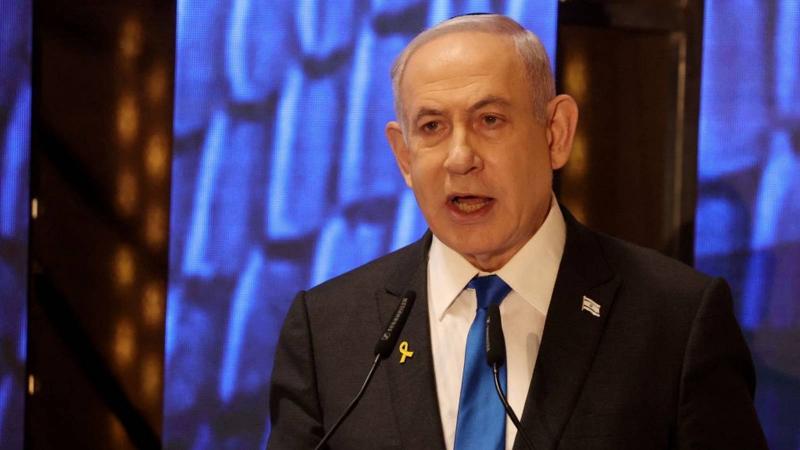The only issue that Israeli Prime Minister Benjamin Netanyahu does not discuss, either publicly or privately, is a clear plan for the day after in the Gaza Strip following the war. He has merely stated that he will not replace "Hamasstan" (the Hamas movement) with "Fatahstaan" (the Palestinian Authority and Fatah movement) and aims to create a completely new culture in the region, without any clarity on what exactly he wants or how he intends to achieve that. Netanyahu's language regarding the post-war scenario in Gaza raises doubts about his intentions to actually leave the region, effectively bolstering his desire to remain there at least until he decides what to do, which implies a "military rule."
A new Israeli report has revealed a document prepared by Israeli researchers about the future of Gaza after the October 7 attack launched by Hamas on the border area. National Security Council Chairman Tzachi Hanegbi described the document as "great," which reinforces the hypothesis that Israel is heading toward military rule in the region. According to "i24 News," shortly after October 7, four Israeli researchers submitted a 32-page document to the National Security Council and the cabinet (the small political and security council), titled "From a Killer Society to a Moderate Society," proposing a solution to the significant issue: who will govern Gaza in the aftermath?
The document, which National Security Council Chairman Tzachi Hanegbi called "great," stipulates a key condition: the complete defeat of Hamas. It assumes two fundamental premises: the first is that after October 7, it has become clear that Israel cannot live alongside a state dominated by a "terrorist organization" like Hamas. The second fundamental assumption is that Gaza must remain Arab and Palestinian.
Professor Danny Orbach, one of the authors of the military document, stated, "These two assumptions lead to the conclusion that a transformation in Gaza is needed." He adds, "However, in order for that to happen, Israel must overcome its sensitivity towards managing the civilian population." Nevertheless, the transformation that Orbach speaks of implies military rule.
The Israeli report questions: "Are we on the path to Israeli military rule in Gaza?" In an effort to clarify the matter, the four researchers studied similar historical cases, such as Japan and Germany after World War II, as well as American military rule in the Middle East following the Gulf War.
The document considered "Germany and Japan" as examples of outstanding success, based on the comprehensive change in civilian societies in these countries, which once held destructive ideologies, relying on total defeat that included "disarmament and the dismantling of the toxic mechanisms of governance." It suggests that there is a need for "reconstruction, which is essential for renewing acceptance into the family of nations," and rehabilitation. This would involve uprooting extremism from radical ideological thoughts, constructing new authoritarian infrastructures, destroying symbols of the old regime, conducting mock trials for war criminals, halting the use of old and extremist texts, and presenting Jewish culture in schools and other venues.
Prime Minister Benjamin Netanyahu supports these ideas, as does Hanegbi, who is quoted saying, "Palestinians will need to generate within themselves leaders interested in prosperity, growth, and governance, rather than experimenting with jihad and encouraging hatred towards Israel."
The document asserts that even if Israel does not wish to rule Gaza and prefers to establish another civil government in the sector, the option of military rule must rise to the surface, especially if Israel wants to implement what is written in the document. The unveiling of the document comes at a time when Israeli leaders warn that Netanyahu intends to impose military rule in the sector. Throughout the war, he has not hesitated to propose the ideas contained in the document, speaking of "total victory, a change in culture and ideology, curriculum reform, and the creation of a different society."
Tal Schneider wrote in "The Times of Israel" last week that Israel is on its way to military rule. Schneider noted that since Defense Minister Yoav Galant warned in May that Prime Minister Benjamin Netanyahu intends to impose Israeli military rule in Gaza, Netanyahu has not denied this intention, and there is increasing evidence that military rule is indeed on its way. Like the tale of the boiling frog, the temperature of the water rises slowly while Netanyahu denies and evades, eager not to "deal with the issue" of the day after in Gaza.
The commentator added that "National Security Advisor Tzachi Hanegbi said there are numerous alternatives for the day after, ranging from Israeli military control to military rule, or local authority rule, or Palestinian clans, or civil societies, or joint forces." Following Hanegbi, Agriculture Minister Avi Dichter called for military control.
Subsequently, a document from Netanyahu's new military secretary, General Roman Gofman, which advocates establishing military rule in Gaza, was revealed. This is not limited to them; many politicians, some influential like former Minister Haim Ramon, have called for establishing military rule in Gaza.
In a previous report, "Haaretz" noted that there is now a proposal on Netanyahu's desk concerning a temporary military administration as an alternative to Hamas. "Yedioth Ahronoth" published a document prepared by the Israeli military establishment that revealed the annual operational costs of such an adventure are estimated at around $5.4 billion, not including the unquantifiable diplomatic costs.
Moreover, the right-wing faction in the government desires military control in Gaza, which seems obvious, as it aims to exploit military rule to promote settlement there. However, can Netanyahu impose military rule in the Gaza Strip after the significant fatigue that his army is experiencing, while Hamas continues to execute deadly hit-and-run attacks in the region, and he has not achieved any of his objectives there?! If he truly intends to do so, he does not want the war to come to an end.




